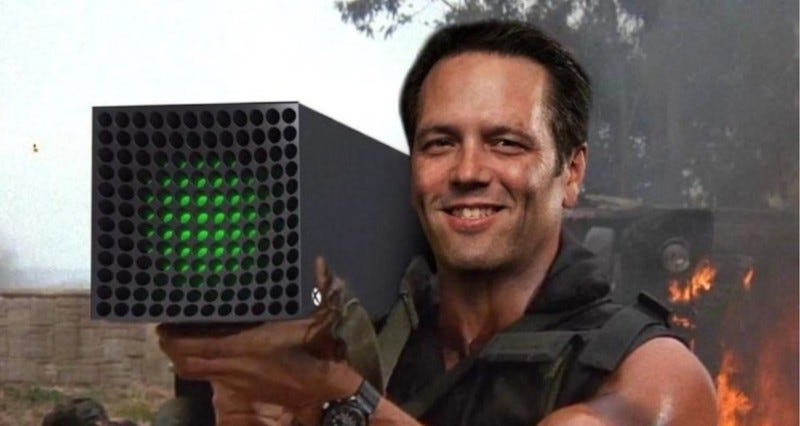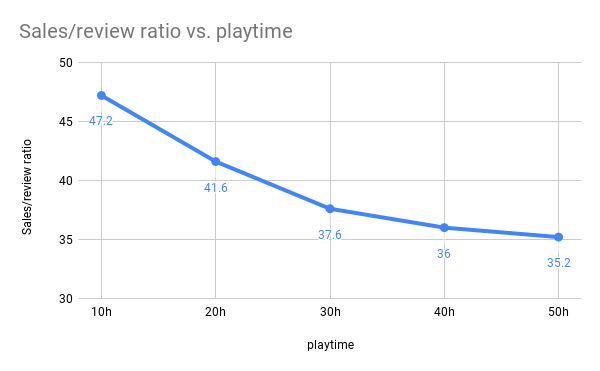What 'Steam review count' tells us about your game
Welcoming a new Data Fellow to GameDiscoverCo, too!
[The GameDiscoverCo game discovery newsletter is written by ‘how people find your game’ expert & company founder Simon Carless, and is a regular look at how people discover and buy video games in the 2020s.]
Welcome back, folks. I know that we’re still in balmy August, and it’s a holiday in some countries today. But we’ve returned to follow up on Gamescom and disgorge lots of data and news in your general direction, regardless.
This time out, we’re starting out with a look at Steam’s review system and how it does - and doesn’t - relate directly to your game’s popularity, thanks to research from GameDiscoverCo’s first ever Data Fellow. So let’s get to it…
[REMINDER: the ‘new user’ pricing of our GameDiscoverCo Plus subscription is going up at the end of August, so grab it now to get Steam pre/post-release data, weekly sales research, an exclusive Discord, detailed game discovery eBooks - with more coming soon - & lots more.]
What Steam review count tells us about your game
One of the best pieces of data we have from Steam is the number of reviews that a game has. At GameDiscoverCo, we’ve surveyed the audience on this multiple times, revealing that you can multiply the # of reviews by ‘a number’ to get unit sales.
But what number? And how reliable is it? We were struck by excellent new research from a newcomer to the Steam analysis space, Strahinja Milenovic from Gamalytic. Above is his estimate of ‘Steam sales multiplier’ distribution - he’s using lots of smart & complex data comparisons to go deeper into Steam data than we’ve seen.
So, to paraphrase Victor Kiam, we liked it so much that we’ve made him our first (paid) Data Fellow, licensed his code/algorithms for GameDiscoverCo Plus (new revenue/player estimates coming soon!), and will work with him on multiple data analyses. (He’ll continue to expand Gamalytic as a personal project, too…)
Anyhow, time to bust out a whole heap of his graphs on ‘how Steam reviews work’ with some helpful commentary, as follows. Reminder - a higher ‘review to sale ratio’ means less reviews per copy of your game sold. And 100 reviews and 5,000 sales is a 50x ratio, aka multiplier:
Median ‘review to sale ratio’ goes down over time: as we’ve seen before, older games have less reviews for each copy sold. And as Strahinja notes, the ‘prompt to review’ that Steam added in 2019 is a major extra reason for this. The other reason for this graph’s shape? Games that have been out a long time are discounted more, and:
If you discount your game a lot, you’ll get less player reviews: great to see real, empirical data on this. (It makes a lot of sense, because a lot of impulse purchases for games that are 50% off result in games that, well.. go into your Steam backlog. And if you haven’t played the game for >0.2 hours, you can’t review it.)
Games with both lower - and higher - Steam player review % get more reviews: reminder that a lower ratio is ‘more reviews written per copy sold’. So it makes a lot of sense that players are either a) writing reviews to tell their fellow Steam gamers not to buy it at Mostly Negative or worse, or b) evangelizing the game to others via enthusiastic reviews, as it hits Overwhelmingly Positive.
Games that get played more - unsurprisingly - get more reviews: the deeper the game, and the more the average playtime goes up, the more likely it is that you’ll get lots more reviews per copy sold - and the ‘sales to review ratio’ will go down.
If your game has less reviews, it has a lower ‘review to player’ multiple: this is probably due to your title having a niche audience who have found it and love it? The ratio for Steam games with <100 reviews (36x) is almost 47% less than the ratio for titles with 1,000 to 10,000 Steam reviews (52.8x).
One final point on audience - which is less easy to graph. Strahinja notes: “If we take a game with a high sales/review ratio like Bravery and Greed and look at the games whose audience overlaps with it (Rogue Heroes: Ruins of Tasos, Backpack Hero), we see they also have a high sales/review ratios… [and] if we look at Elden Ring we will see that the overlapping games (Dark Souls III, Monster Hunter: World) also have relatively low sales-to-review ratios.”
Audience - and really, we’re talking about personas here - is a combination of many demographics - region, types/genres of game played, etc. We’ve seen this before with clients’ games who have casual audiences. These players leave shorter reviews at a higher ‘review to sales’ multiplier - but still love playing the game and pay you for it!
[If you’d like to see Strahinja’s full research on review multipliers, it’s available here. And we’re planning lots more collaborations in the future, so watch out for those.]
Xbox: Gamescom x Spencer x Eurogamer insight!

Probably the most interesting platform-centric interview coming out of Gamescom was Xbox head Phil Spencer sitting down with Eurogamer. The combination of a smart, fleet-of-foot leader and ‘no question is off limits’ led to some great insight.
Running it down, here’s some of the platform or discovery highlights for us:
Activision’s titles could be key to an Xbox mobile App Store: as excerpted separately by Eurogamer, Spencer notes: “If you go back to the origins of how Steam got created, that was about a place for Valve to distribute their content. Why did the players go there? Because Half-Life was awesome.” So having games like Candy Crush Saga and Diablo Immortal - with exclusive bonuses or subs, maybe - would be “content to draw interest from players, which then draws interest from creators to create”.
Criticism of parity issues between Xbox Series S/X is largely dismissed: in the news due to issues getting Baldur’s Gate 3 working splitscreen on Series S - Xbox just agreed with Larian it can ship without it, Spencer says: “I don't see a world where we drop S… Having an entry level price point for console, sub-$300, is a good thing for the industry... I think it's important. So we're committed.” Being looser on 100% parity seems key, tho, given other dev rumblings about the trickiness of balancing Xbox’s system requirements against Sony’s more monolithic approach.
Xbox is pitching ‘playing AAA console games on mobile’ as a key feature: this is via Xbox’s cloud feature set and Game Pass/App Stores. Phil says: “I want to make sure - for the health of those retail games - that [“the amazing games that are on the Gamescom showfloor today”] are available on the fastest-growing gaming platform, which happens to be the mobile phone.” Adoption is unclear, but it can only be growth for Xbox if any of it works…
Spencer pushes back - lightly - against the concept of the ‘console generation’: he says: “Take PC as an example. We don't really talk about the latest AMD and Nvidia GPUs as part of a generation… when you ask about Gen 10 I can say yes, but also at a higher level commentary, I'm wondering if this notion of step function is just going to hold in the console, or is it going to be more continuous?”
Spencer is a canny operator, and much of his language seems to be Xbox’s view of the future as a fluid, multi-platform mix. In this world, the Xbox is more PC-like in upgrades, with cross-platform mobile game & store usage also (hopefully!) increasing, as iOS/Android monopolies get decontructed at government legislation levels.
But he’s up against Sony, which targets PC later with its key games, has a big install-base advantage with hardware, and re: Sony hardware, is largely telling devs ‘you just need to make games for PlayStation 5’ - which can make smooth porting to the (relatively underpowered) Xbox Series S painful. Fascinating.
The game discovery news round-up..

Seems like everyone’s recovering from Gamescom this week. But there’s quite a bit to catch up on from around the show - and separately - as follows:
Epic has announced the Epic First Run program, which “gives participants the opportunity to boost their net revenue from user spending on eligible products from 88% to 100% in their first six months on the Epic Games Store.” Will be interesting to see who takes it up - maybe v.popular PC games doing Early Access could benefit, Darkest Dungeon II-stylee. But ‘annoying your Steam customers’ is a big threat.
Gamescom-related announcements with platform ramifications? Another trailer for Ara: History Untold, which is a Microsoft-funded PC Game Pass Day 1 title, so a non-Xbox play on Game Pass (fairly rare); Netflix’s transmedia plans take off with Zack Snyder’s Rebel Moon getting a tie-in game from Super Evil Megacorp.
Developer turned VC David Kaye has a new piece up about ‘the end of cheap money for games’, and wanted to highlight the section on embracing ‘minimum visual fidelity’: “figuring out the lowest level of visual polish you can get away with to attract your target audience.” We agree.
It sounds like the Saints Row reboot might be the lead PlayStation Plus Essential game for September 2023? We actually talked about this game in our Plus newsletter on Friday after its Steam debut, since it wasn’t reviewed well and underperformed Embracer’s estimates, but we estimate it’s “quietly sold around 700k copies on Xbox and 1.2mil on PlayStation, many at discounted prices.”
For anyone who missed Opening Night Live at Gamescom, here’s a rundown of all the announcements, including updates on a whole load of big games. Semi-relatedly, The Game Awards, another Keighley-verse production, locked down Thursday, Dec. 7th in L.A. as its date. (But who is the Kang of the Keighley-verse?)
Sounds like Nintendo is further cracking down on players eShop region-hopping for bargains: “Switching a Nintendo account's location from the UK to Argentina removes pre-saved payment options. It also wouldn't accept a British debit card as a form of payment, and it wouldn't support PayPal at all.” Not all region switching is blocked, but perhaps the most egregious?
PlayStation’s slightly odd Portal device is officially announced, described as follows: “PlayStation’s first Remote Play dedicated device, PlayStation Portal remote player, to launch later this year at $199.99.” This is a ‘local WiFi’-only way to play your PlayStation 5 games portably. (Perhaps it resonates more with Japanese execs for cultural reasons re: living room/house size? It’ll sell, but not loads.)
Social media things: you can search for branded influencer content on Instagram/Facebook by advertiser name now, which can be entertaining; a new survey says that 76% of teenagers have watched people playing games on YouTube, 40% watch on Facebook. 34% on Twitch, and 20% on the fairly new Kick.
Looks like Irdeto/Denuvo announced some new Nintendo Switch ‘hack/emu’ protection, and also a tool to stop fans/hackers decrypting Unreal Engine data. Bonus: now they’re not just an ‘anti-piracy’ company, you get weird quotes like this from the CEO: “We are creating new weapons for the gaming industry’s fight against hackers trying to do things with games that are not supposed to be done.”
Shout-out to MobileGamer.biz for continuing to do good journalism/data in the mobile game space - they just spoke to Scopely about Monopoly Go’s success, revealing “it was once a midcore, Clash Royale-like PvP game”, before it pivoted in a Coin Master direction and took off.
Finally, the most entertaining announcement of Gamescom - by far - was Hori’s hook-up with the Farming Simulator devs on this PC ‘farming vehicle control system’:
Now, you too can get more serious about your virtual tilling! And heck, Farming Simulator 22 has 40,000 average daily CCU on Steam alone - so the market’s there…
[We’re GameDiscoverCo, an agency based around one simple issue: how do players find, buy and enjoy your PC or console game? We run the newsletter you’re reading, and provide consulting services for publishers, funds, and other smart game industry folks.]







